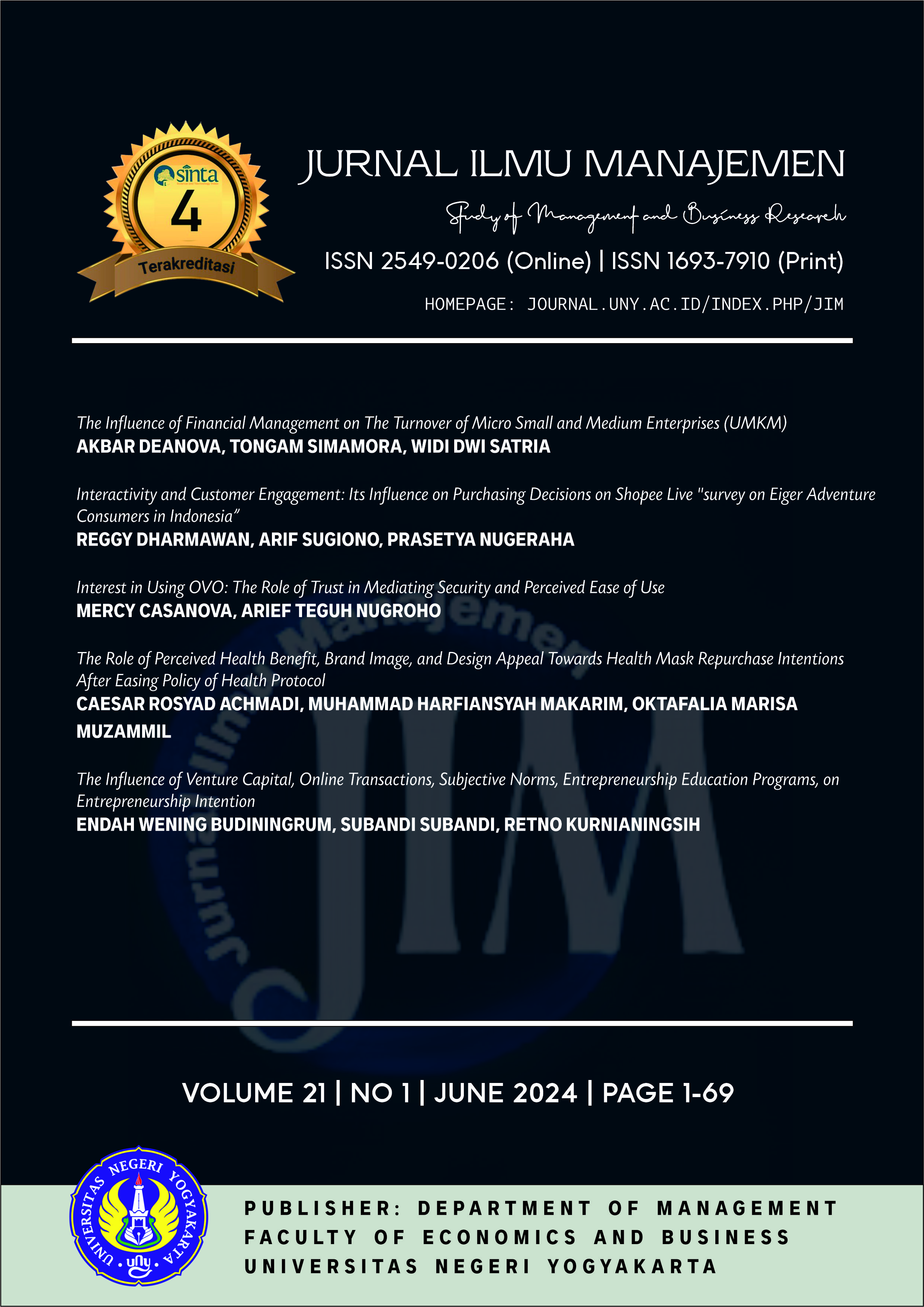THE ROLE OF PERCEIVED HEALTH BENEFIT, BRAND IMAGE, AND DESIGN APPEAL TOWARDS HEALTH MASK REPURCHASE INTENTIONS AFTER EASING POLICY OF HEALTH PROTOCOL
DOI:
https://doi.org/10.21831/jim.v21i1.73086Abstract
This research entitled "The Influence of Perceived Health Benefit, Brand Image, and Design Appeal Towards Repurchase Intentions After Easing Policy of Health Protocol" has three objectives, namely: (1) Knowing the influence of perceived health benefit towards health mask repurchase intentions, (2) Knowing the influence of brand image towards health mask repurchase intentions, (3) Knowing the influence of design appeal towards health mask repurchase intentions. WHO (2020) describes a health mask as a loose, disposable device that creates a physical barrier between the wearer's mouth and nose as well as potential contaminants in the immediate environment. The method of this study is quantitative method. The population in this study was citizen of Indonesia in Java Island at least 17 years old who purchase health mask in recent three months. The sample in this study is 248 respondents. Data collecting method using online questionnaire and processed using SPSS version 26. The result of this study are: (1) Perceived health benefit has a significant effect on repurchase intention, (2) Brand image has a significant effect on repurchase intention, (3) Design appeal has a significant effect on repurchase intention.References
Baksi, A. K., & Panda, T. K. (2018). Branding destinations with multisensory brand associations and evaluating its impact on behavioural pattern under the intervention of multiplex phenomenon of relationship-branding. Management Science Letters, 8(11). https://doi.org/10.5267/j.msl.2018.8.007
De Temmerman, J., Heeremans, E., Slabbinck, H., & Vermeir, I. (2021). The impact of the Nutri-Score nutrition label on perceived healthiness and purchase intentions. Appetite, 157. https://doi.org/10.1016/j.appet.2020.104995
El Shiffa, N. A., Rahmiati, F., Santoso, A. S., & Yustina, A. I. (2021). Strategic entrepreneurship for achieving customers repurchase intention amidst pandemic COVID-19 on digital multi-sided platform: A case of Traveloka. Procedia Computer Science, 197. https://doi.org/10.1016/j.procs.2021.12.138
Gumí , J. (2021). What influences individual perception of health? Using machine learning to disentangle self-perceived health. SSM - Population Health, 16. https://doi.org/10.1016/j.ssmph.2021.100996
Hair, J. F., & Brunsveld, N. (2019). Essentials of business research methods. In Essentials of Business Research Methods. https://doi.org/10.4324/9780429203374
Hauser, D., Leopold, A., Egger, R., Ganewita, H., & Herrgessell, L. (2022). Aesthetic perception analysis of destination pictures using #beautifuldestinations on Instagram. Journal of Destination Marketing and Management, 24. https://doi.org/10.1016/j.jdmm.2022.100702
Huang, L. C., Gao, M., & Hsu, P. F. (2019). A study on the effect of brand image on perceived value and repurchase intention in ecotourism industry. Ekoloji, 28(107).
Ibzan, E., Balarabe, F., & Jakada, B. (2016). Consumer satisfaction and repurchase intentions. Developing Country Studies, 6(2), 96–100. Developing Country Studies, 6(2).
Istanbulluoglu, D., & Sakman, E. (2024). Successful complaint handling on social media predicts increased repurchase intention: The roles of trust in company and propensity to trust. European Management Journal, 42(1). https://doi.org/10.1016/j.emj.2022.06.004
Kelvin, K., Lane Keller เป, K., & Osborn, น. E. (2017). Kotler, Philip and
Keller Kelvin Lane. (2016). Marketing Management. (15th global edition) Edinburgh: Pearson Education. (679 pp). Kasem Bundit Journal, 18(2).
Klepacz, N. A., Nash, R. A., Egan, M. B., & Raats, M. M. (2016). When Is an Image a Health Claim? A False-Recollection Method to Detect Implicit Inferences About Products' Health Benefits. Health Psychology, 35(8). https://doi.org/10.1037/hea0000317
Kotler, P., & Armstrong, G. (2017). Principles of Marketing, (17th edn, Global Edition). In Harlow: Pearson.
Law, C. C. H., Zhang, Y., & Gow, J. (2022). Airline service quality, customer satisfaction, and repurchase Intention: Laotian air passengers' perspective. Case Studies on Transport Policy, 10(2). https://doi.org/10.1016/j.cstp.2022.02.002
Li, H., Luo, W., Hou, Y., Xia, Y., Yao, J., Kang, N., Deng, C., Sun, H., & Chen, C. (2021). Factors Affecting Perceived Health Benefits and Use Behaviors in Urban Green Spaces During the COVID-19 Pandemic in Southern China Megacities. Frontiers in Public Health, 9. https://doi.org/10.3389/fpubh.2021.759444
Li, Z., & XiaoBo, C. (2022). Recommendation algorithm of influence and trust relationship. Multimedia Tools and Applications, 81(11). https://doi.org/10.1007/s11042-022-12231-5
Lin, Z., & Filieri, R. (2015). Airline passengers' continuance intention towards online check-in services: The role of personal innovativeness and subjective knowledge. Transportation Research Part E: Logistics and Transportation Review, 81. https://doi.org/10.1016/j.tre.2015.07.001
Peštek, A., & Činjarević, M. (2014). Tourist perceived image of local cuisine: The case of bosnian food culture. British Food Journal, 116(11). https://doi.org/10.1108/BFJ-01-2014-0046
Pikkemaat, B., & Weiermair, K. (2003). the Aesthetic ( Design ) Orientated Customer in Tourism - Implications for Product Development. EIASM-10th International Product Development Management Conference, May 2014.
Schindler, & Pamela S. (2019). Business Research Methods, 13th Edition. In Business Research Methods (Issue 13).
Tajiki, I., Vizeshfar, F., & Keshtkaran, Z. (2022). The effect of training program based on health belief model on burn prevention knowledge in mothers of children aged to 1–3 years: A randomized controlled. Burns, 48(4). https://doi.org/10.1016/j.burns.2021.11.001
Thielsch, M. T., & Niesenhaus, J. (2017). User Experience, Gamification, and Performance. In The Wiley Blackwell Handbook of the Psychology of the Internet at Work. https://doi.org/10.1002/9781119256151.ch5
Wang, E. S. T., & Tsai, M. C. (2019). Effects of the perception of traceable fresh food safety and nutrition on perceived health benefits, affective commitment, and repurchase intention. Food Quality and Preference, 78. https://doi.org/10.1016/j.foodqual.2019.103723
Woelfel, C., Krzywinski, J., & Drechsel, F. (2013). Knowing, reasoning and visualizing in industrial design. Knowledge Engineering Review, 28(3). https://doi.org/10.1017/S0269888913000258
Downloads
Published
How to Cite
Issue
Section
License
An author who publishes in the journal "Jurnal Ilmu Manajemen (JIM)" agrees to the following terms:
Author retains the copyright and grants the journal the right of first publication of the work simultaneously licensed under the Creative Commons Attribution-ShareAlike 4.0 License that allows others to share the work with an acknowledgement of the work's authorship and initial publication in this journal.
Author is able to enter into separate, additional contractual arrangements for the non-exclusive distribution of the journal's published version of the work (e.g., post it to an institutional repository or publish it in a book) with the acknowledgement of its initial publication in this journal.
Author is permitted and encouraged to post his/her work online (e.g., in institutional repositories or on their website) prior to and during the submission process, as it can lead to productive exchanges, as well as earlier and greater citation of the published work (See The Effect of Open Access).
All materials in this site are protected by the law. It is prohibited to quote a part of or all of this website contents for commercial purposes without the permission or consent of the editors.
If anyone finds one article or more in this journal violate or potentially violate one's copyrights, please report to us through e-mail of Principle Contact.
Legal-formal aspects of accessing any information and manuscript in this journal website refer to the provision of license Creative Commons Attribution-Share Alike (CC BY-SA). Read more about the Creative Commons Attribution-ShareAlike 4.0 Licence here: https://creativecommons.org/licenses/by-sa/4.0/.
All information available in 'Jurnal Ilmu Ekonomi (JIM)' is academic in nature. 'Jurnal Ilmu Ekonomi (JIM)' is not responsible for loss due to the abuse of information in the website.



.png)

